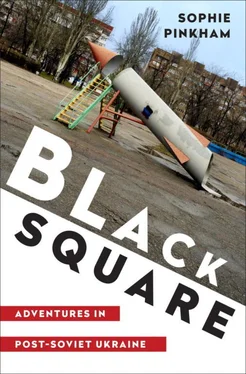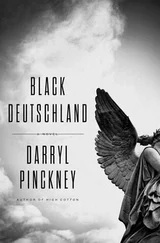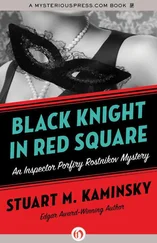Over the next decades, the Soviets built a new world, with millions of casualties along the way. But by 1991 the countries of the former Soviet Union found themselves at another zero point, forced to reinvent and rebuild yet again. And then there was Maidan. More than a hundred people were killed during the protests; some ten thousand died in the war that followed. Ukraine and Russia, which supported and prolonged the conflict, descended into paranoia and rage.
As a physical space and as a historical moment, Maidan was a kind of Black Square, a ground zero. Maidan is the place where history ends and returns and begins, the moment of liberation that lays bare the uncertainty of the future. The Black Square contrasts with Moscow’s Red Square, the center of Russian power and the emblem of Communism, but black and red are also the colors of Ukraine’s radical nationalism, of fertile earth and spilt blood. The Black Square evokes both utopian dreams and the threat of anarchy. Malevich’s icon was worshipped by some, but denounced by others as a “sermon of nothingness and destruction.”
For many Western observers, Maidan confirmed the ineluctable movement toward liberal democracy, the “end of history” that was celebrated after the fall of the Soviet Union but later slipped out of view. The Western idea of Maidan was the negative image of the Russian one: the Russian government and its media portrayed Ukraine’s Revolution as a neo-Nazi coup, a fascist junta. But history never ends; our world is composed of many colors, and many voices.
A NOTE ON THE TRANSLITERATION
There are several ways of transliterating Ukrainian and Russian words. (The two languages use slightly different Cyrillic alphabets.) In the interest of legibility, I have used simplified versions of the Library of Congress transliteration systems. When someone has a clear preference about how his or her name should be transliterated, I have used that spelling (e.g., Klitschko rather than Klichko). In cases of personal names that have the same Cyrillic spelling in Russian and Ukrainian and are recognizable to English readers, I have chosen the familiar spelling rather than the Ukrainian transliteration (e.g., Igor rather than Ihor). For the names of places in contemporary Ukraine that have slightly different names in Russian, I have used the Ukrainian names and transliterations (e.g., Lviv rather than Lvov, Dnipropetrovsk rather than Dnepropetrovsk), except in the case of Kiev (rather than Kyiv) and Odessa (rather than Odesa), where I have chosen to use the spellings long familiar to English speakers.
PART I
NEW WORLDS

Iwas at an academic cocktail party, already tired of explaining why I was going to Siberia. As I refilled my glass of sherry, I was wrestled into conversation by my boyfriend’s professor, a zaftig Renaissance scholar with a heavy southern accent.
I explained that I was going to Siberia for six weeks on a government exchange, to work at an HIV program at the Russian Red Cross.
“Now, is it safe to go to Russia?” she asked. It was 2004; the school massacre in Beslan had occurred a month earlier, the day after I agreed to take part in the program.
“Yes,” I answered. “I mean, it’s really not very dangerous, as countries go. And it’s not like I’m going to Chechnya, or even Moscow. No terrorist would bother going all the way to Siberia.”
“Well, I’m just concerned for your safety, honey.” The Renaissance scholar looked tipsy. “Because I have a nephew, and he and his girlfriend went to South Africa to work there, okay?” She lurched forward and waved her glass at me. “And she was walking alone, and she was raped by ten men, all at once, okay?” She leaned back, satisfied that she had made her point. “That girl has never been the same.”
“South Africa and Russia are pretty different,” I said. I was thinking: Christopher Columbus, Lewis and Clark didn’t worry about getting raped! On the other hand, I was not Christopher Columbus, or Lewis and Clark. My father had recently sent me an email asking if I was sure it was safe, and whether my trip would keep me from applying to graduate school. Lewis and Clark never went to graduate school! But I didn’t say that to my father.
MY FIRST GLIMPSE of Russia was through the fogged-up window of a tour bus: a stand of birches, slender and pale beside the long highway. Scattered among the trees were dilapidated barns, wooden shacks with tin roofs, rusted-out cars, scrap metal, and concrete buildings with opaque windows. These buildings seemed to be in the middle of nowhere, but still they declared CAFÉ, or ICE CREAM, or GROCERIES. I was pleased to be able to read the Russian words. I’d studied Russian in college for a year, just enough to learn the rudiments of grammar and a primitive vocabulary.
Our bus crossed a moatlike stream guarding a Holiday Inn, a beige castle stranded in the barren landscape. We piled out of the bus and into the hotel, where neon signs and pinging noises wooed guests into a casino on the ground floor. At dinner, served in the hollow center of the building, I loaded my tray with lukewarm cabbage and dumplings and took a seat next to a shy man who was, as it turned out, one of the only Americans in the program who could actually speak Russian.
At the mansion of the American ambassador, we listened to speeches and mingled with reporters. The word volunteerism was used often, with enthusiasm. But in our case, the term volunteer wasn’t quite accurate: our exchange program was organized and paid for by the United States and Russia, part of a friendship campaign.
During our orientation at the Holiday Inn, we Americans were given practical information about banks and doctors and common Russian scams. Our Russian counterparts, meanwhile, learned about the concept of “personal space,” and were instructed not to stand too close to Americans or touch them without an invitation. The Russians later told us that they found this ridiculous. Why can’t Americans stand close together? they asked. It was a good question. I found that I liked it when Russians invaded my personal space; it made it easier to make friends.
Some of the Russians—Vadim, Irina, and Olya—offered to take some of us Americans out to a club. We went to the center of the city, which looked to me like a bigger, glitzier, orientalized Paris, and through Red Square—where, a decade later, the conceptual artist Pyotr Pavlensky would nail his scrotum to the cobblestones—past the Kremlin and St. Basil’s Cathedral and Lobnoye Mesto, which I was told was the place where people used to be executed, though this was just a myth, and where Pussy Riot would stage one of their first performances, a few years later. I found these tourist sites to be divinely beautiful. I loved the scale of Red Square, and the line of fir trees in front of the Kremlin’s stone wall, and the coy, colorful onion domes of the cathedral. We drank Siberian Coronas, whose name delighted me, in an underground street crossing, which I learned was called a perekhod , or “go-across,” and we watched some hooligans carouse, and then we walked down an avenue and onto a little mall full of shops, through a passageway with a velvet curtain, into a big café called Gogol, where we met Vadim’s friends. I couldn’t understand a word they said, though they were standing right beside me; their words ran together like paint in the rain.
After a few drinks we took the metro to a gay club.
“Why are we going to a gay club?” I asked Vadim. He was pretty cute: tall and skinny, with a brown cowlick that reminded me of Tintin’s.
Читать дальше













